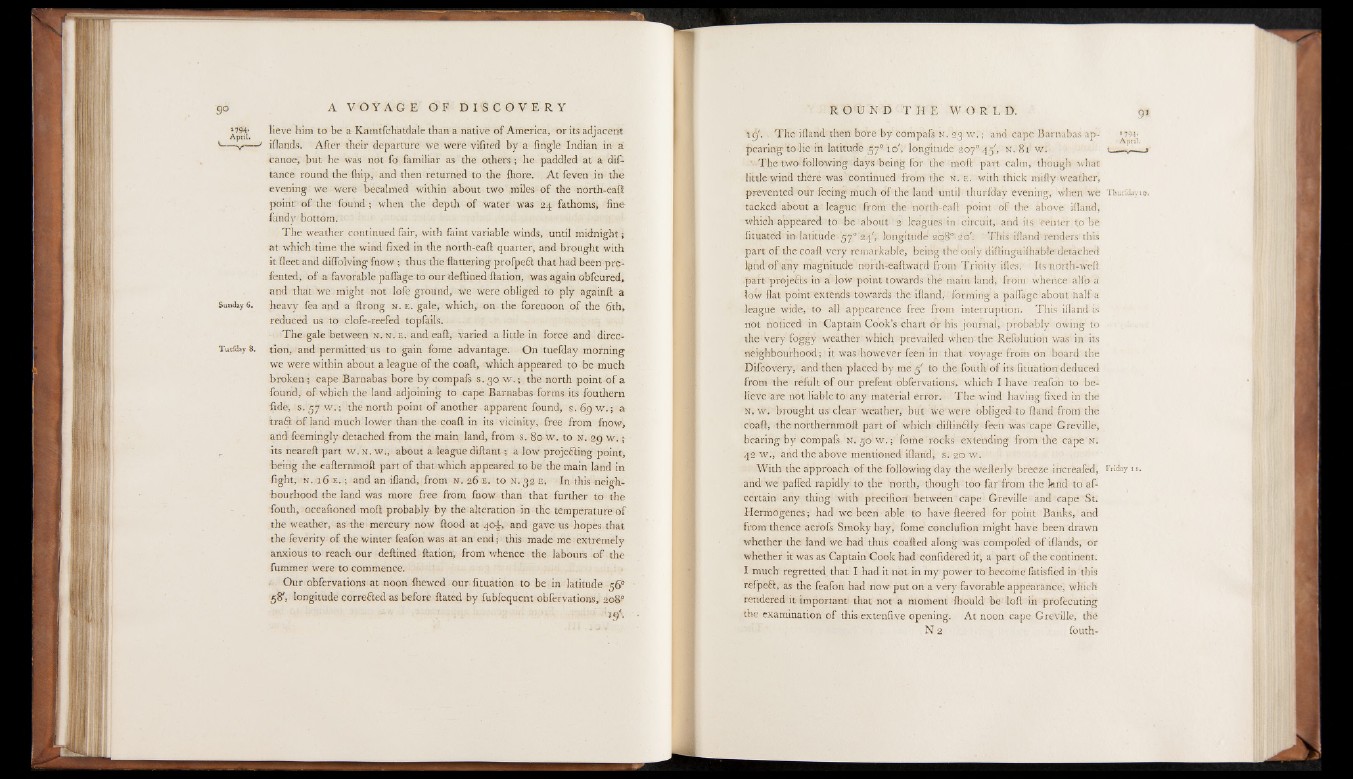
£>94- lieve him to be a Kamtfchatdale than a native of America, or its adjacent
'--- v — ' iflands. After their departure we were vifited by a Angle Indian in a
canoe, but he was not fo familiar as the others; he paddled at a dif-
tance round the {hip, and then returned to the fliore. At feven in the
evening we were becalmed within about two miles of the north-eaft
point' of the found; when the depth of water was 24 fathoms, fine
fandy bottom.
The weather continued fair, with faint variable winds, until midnight j
at which time the wind fixed in the north-eaft quarter, and brought with
it fleet and diffolving fnow ; thus the flattering profpect that had been pre-
fented, of a favorable paflage to our deftined ftation, was again obfcured,
and that we might not lofe ground, we were obliged to ply againft a
Sunday 6. heavy fea and a ftrong N. E. gale, which, on the forenoon of the 6th,
reduced us to clofe-reefed topfails.
The gale between n. n, e. and eaft, varied a little in force and direc-
Tuefday 8. tion, and permitted us to gain fome advantage. On tuefday morning
we were within about a league of the coaft, which appeared to be much
broken ; cape Barnabas bore by compafs s. go w . ; the north point of a
found, of which the land adjoining to cape Barnabas forms its fouthern
fide, ;s, 57 w .; the north point of another apparent found, s. 6g w . ; a
traQ; of land much lower than the coaft in its vicinity, free from fnow,
and feemingly detached from the main land, from s. 80 w. to n. 2g w . ;
r its neareft part w. N. w., about a league diftant; a low projefiling point,
being the eafternmoft part of that which appeared to be the main land in
fight, N. 16 e..; and an ifland, from N. 26E. to N. 32 Et In this neighbourhood
the land was more free from fnow than that further to the
fouth, occafioned moft probably by the alteration in the temperature of
the weather, as the mercury now flood at 40J-, and gave us hopes that
the feverity of the winter feafon was at an end; this made me extremely
anxious to reach our deftined ftation', from whence the labours of the
fummer were to commence.
Our obfervations at noon {hewed our fituation to be in latitude 56°
58', longitude correfted as before ftated by fubfequent obfervations, 208°
1 c/. The ifland then bore by compafs N. 23 w . ; and cape Barnabas ap-
pearing to lie in latitude 579 io'i longitude 207° 45', n. 81 w. 1 - - ■
The two following days being for the moft part calm, though what
little wind there was continued from the n. e. with thick mifty weather,
prevented our feeing much of the land until thurfday evening, when we ThurfUayio.
tacked about a league from the north-eaft point of the above ifland,
which.appeared to be about 2 leagues in circuit, and its. center to be
fituated in. latitude-57°'24', longitude 208”' 20'. This ifland renders this
part of the coaft very remarkable, being the1 only diftinguilhable detached
land of--any magnitude north-eaftward from. Trinity files; Its north-weft
part projects in a low point towards the main land, from whence alfo a
low flat point extends towards the ifland, forming a paflage about half a
league wide, to all appearence free from interruption. This ifland is
not noticed in Captain Cook’s chart or his journal, probably owing to •
the very foggy - weather which prevailed when the Refolution was in its
neighbourhood; it was ’however feen in that voyage from on board the
Difcovery, and then placed by me 5' to the fouth of its fituation deduced
from the refult of our prefent obfervations, which I have reafon to believe
are not liable to any material error. The wind having fixed in the
N. w. brought us clear weather, but we'were obliged to Hand from the
coaft, the northernmoft part of which diftindlly feen was cape Greville,
bearing by compafs N. go w . ; fome rocks extending from the cape N.
42 w., and the above mentioned ifland, S. 20 w.
With the approach of the following day the wefterly breeze increafed, Friday 11.
and we pafled rapidly to the north, though too far from the land to af-
certain any thing with precifion between cape Greville and cape St.
Hermogenes; had we been able to have fleered for point Banks, and
from thence acrofs Smoky bay, fome conclufion might have been drawn
whether the land we had thus coafted along was compofed of iflands, or
whether it was as Captain Cook had confidered it', a part of the continent.
I much regretted that I had it not. in my power to become fatisfied in this
refpeft, as the feafon had now put on a very favorable appearance, which
rendered it important that not a moment ftiould beToft in profecuting
the examination of this extenfive opening. At noon cape Greville, the
N 2 fouth